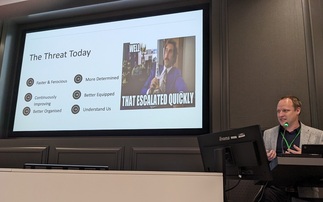GCHQ has been building a database of personal information on almost everyone in the UK for 15 years - with successive governments' support
Privacy International has released a tranche of documents that show how spy agency GCHQ has been gathering a huge database of personal information and communications - with the full approval of gov...
To continue reading this article...
Join Computing
- Unlimited access to real-time news, analysis and opinion from the technology industry
- Receive important and breaking news in our daily newsletter
- Be the first to hear about our events and awards programmes
- Join live member only interviews with IT leaders at the ‘IT Lounge’; your chance to ask your burning tech questions and have them answered
- Access to the Computing Delta hub providing market intelligence and research
- Receive our members-only newsletter with exclusive opinion pieces from senior IT Leaders























